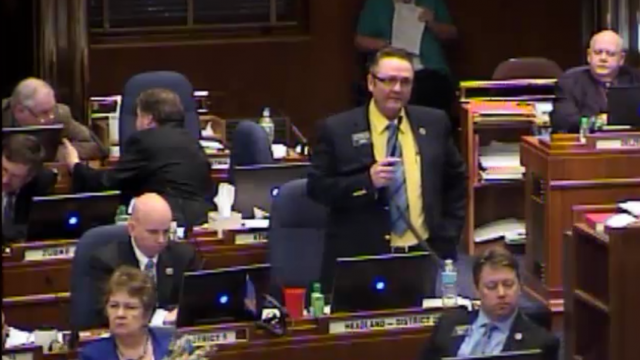Video: House Kills Tobacco Tax Increase, Increase Restrictions On E-Cigs

The House today had one of its most protracted debates of the session to date today. It was related to tobacco and e-cigarettes, and spread over three separate bills.
- HB1078 adds e-cigarettes to the state’s ban on tobacco sales to minors
- HB1186 adds e-cigarettes to prohibitions on sales of tobacco through direct-sale displays (meaning e-cigs have to go behind the counter now)
- HB1421 was one of two bills to increase tobacco taxes in the state (the other is in the Senate)
The first two bills passed by relatively wide margins, though there is obviously some distaste among some members of the House for treating e-cigarettes the same as traditional tobacco products. We got a preview of that debate last month when the House took up an amendment, ultimately defeated, which would have exempted e-cigarettes from the definition of tobacco products for the purposes of taxation. Today amendments to HB1186 which created definitions for e-cigarettes and other nicotine products which are distinct from traditional tobacco-based products did pass.
[mks_pullquote align=”right” width=”300″ size=”24″ bg_color=”#000000″ txt_color=”#ffffff”]”I don’t think we should use taxes in punitive ways to promote a certain social behavior,” he said.[/mks_pullquote]
But most of the debate focused on HB1421, sponsored by Rep. Jon Nelson (R-Rugby), which would raise the per-pack tax on cigarettes by about 250 percent, from $0.44 per pack to $1.54. It would also increase the tax on snuff from $0.60 per ounce to $2.72 per ounce, a 353 percent increase, and the tax on chewing tobacco would go from $0.15 per ounce to $0.73 per ounce, a 356 percent increase.
It was, as I’ve mentioned, a lengthy debate with all the usual arguments bandied about by the different sides. Ultimately the bill failed 34-56.
Amid all the sound and fury, I thought Rep. Craig Headland, Chairman of the House Finance and Tax Committee, expressed the sense of the majority most eloquently.
“What if taxes don’t have much of an impact on consumption?” Headland asked. That’s an interesting question given that tobacco use is most prevalent among lower-income citizens.
“Would they support a tax on low income people if they knew it would have little impact on their consumption?” Headland asked, referring to supporters of the bill. He then questioned the use of taxation manipulate behavior.
“I don’t think we should use taxes in punitive ways to promote a certain social behavior,” he said.
Of course, the government does that sort of thing all the time, but it’s a point well-made. Particularly when he questions whether or not higher taxes will impact actual consumption.
As I pointed out on the blog previously, research indicates that higher tobacco taxes are likely to result in increase tobacco smuggling. That certainly seems to be Minnesota’s experience where enforcement agents found bootlegged tobacco at 40 percent of the retail outlets they checked after the state raised taxes. Before the state’s tax hikes they were finding bootlegged tobacco at about 8 percent of stores.




